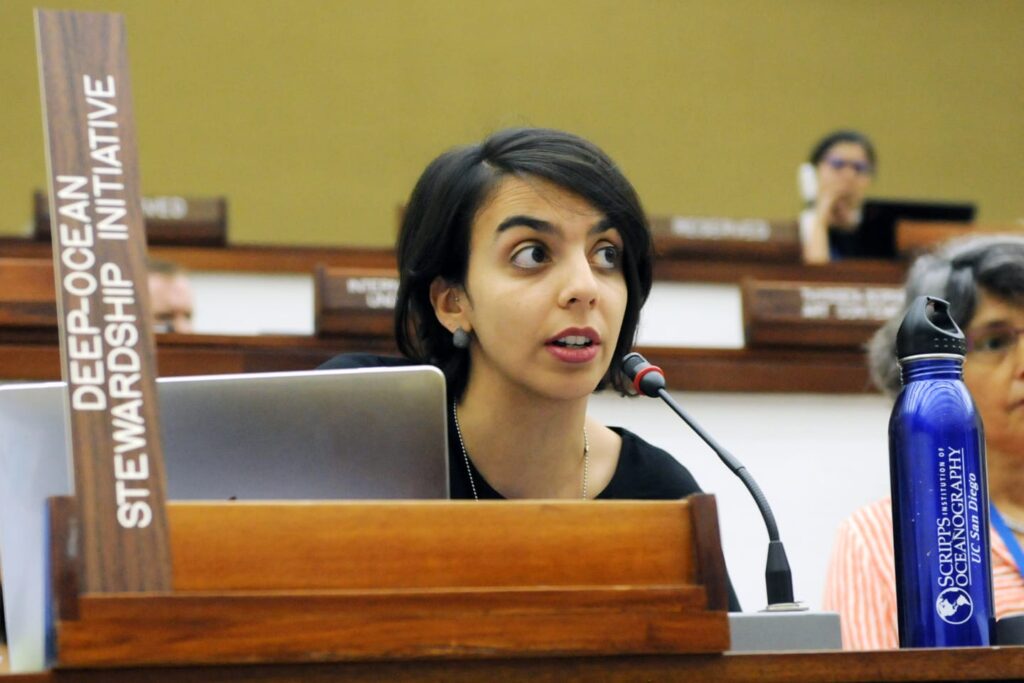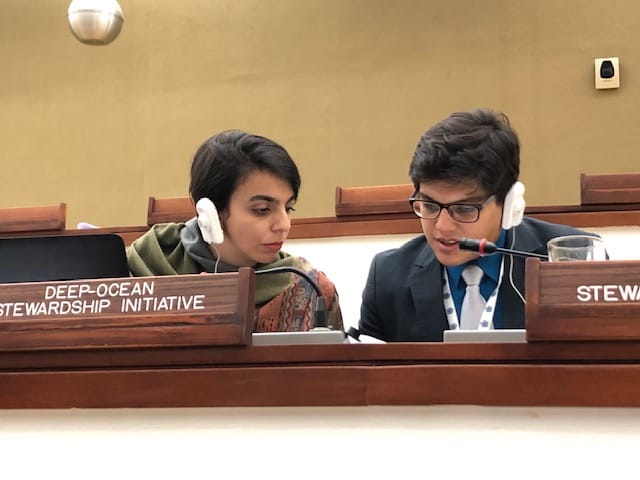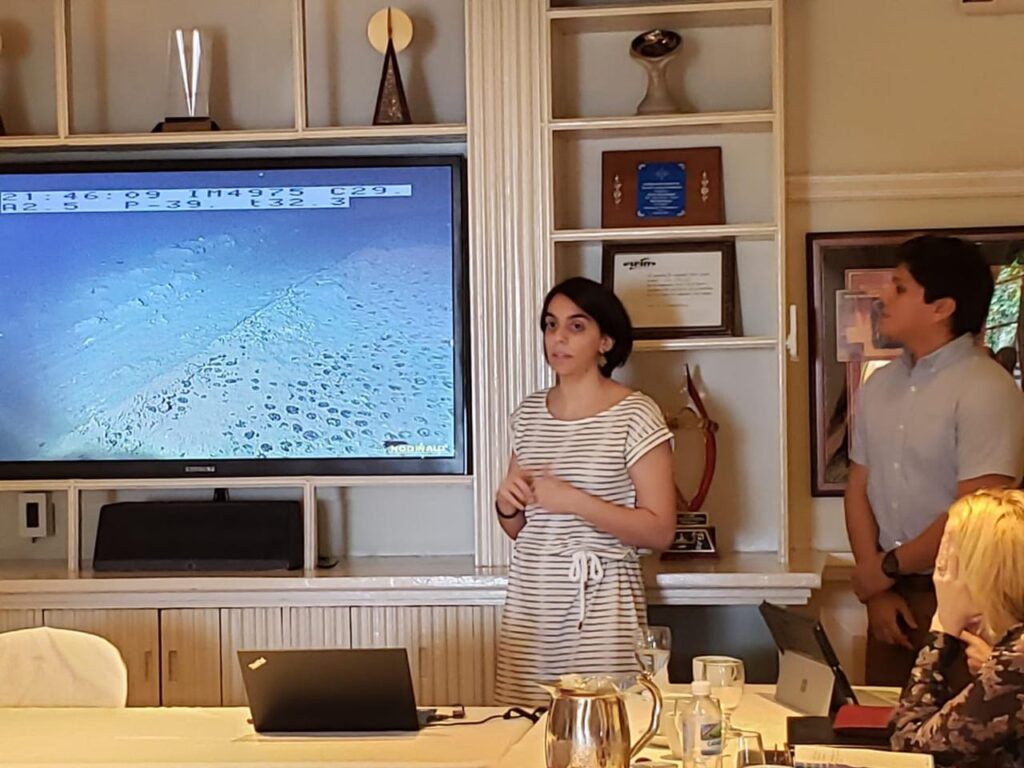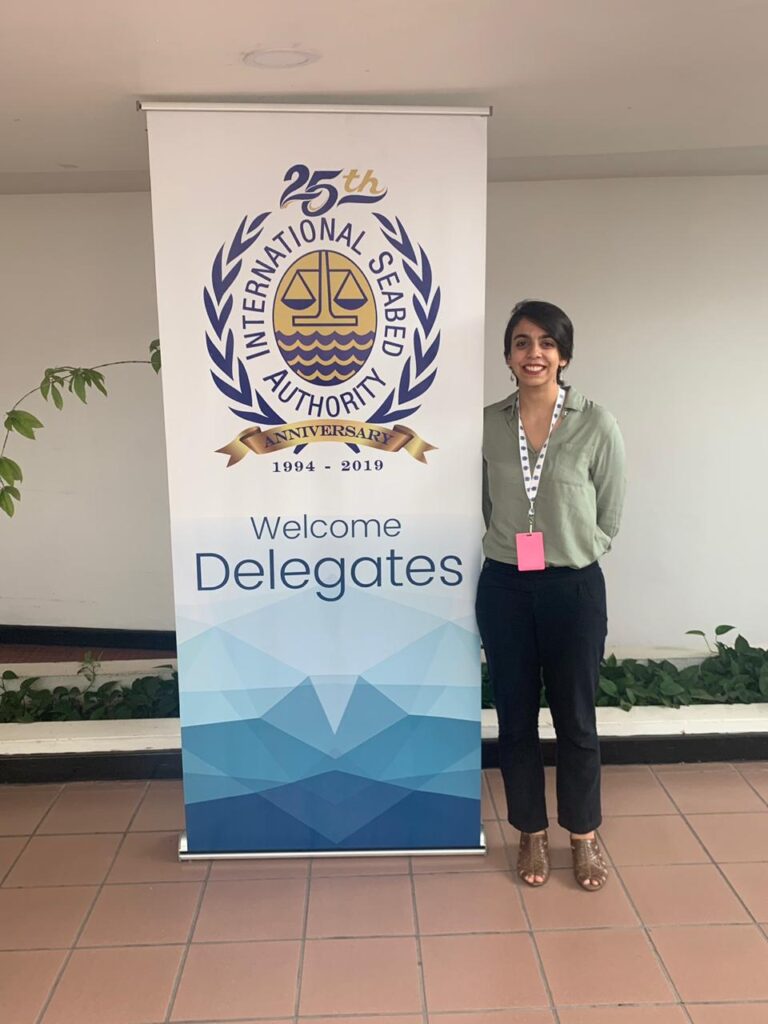Interview with Maila Guilhon
Maila Guilhon is a PhD researcher at the University of São Paulo in Brazil. Her main interests are related to ecosystem-based management, deep-sea conservation, deep-sea mining and areas beyond national jurisdiction (ABNJ); her current PhD research is entitled “Opportunities and challenges for the incorporation of the ecosystem-based approach in seabed conservation: a case study on mineral exploration in the Rio Grande Rise”.
Maila delivered an intervention on DOSI’s behalf at the 26th International Seabed Authority and, in a pre-session event, co-delivered a talk to GRULAC members on deep-ocean habitats currently leased for exploration and the submissions on Regional Environmental Management Plans (REMPs) made by Germany and the Netherlands. Maila is a passionate and talented early career researcher and DOSI is delighted that she has accepted a position on our Advisory Board for 2021-23. In this, the first in a series of interviews with our new Advisory Board members, Maila gives us an insight into her ongoing research and experience at the science-policy interface in Brazil and beyond.
How are you involved in deep-ocean stewardship?
Currently, I am a doctoral researcher at University of São Paulo, Brazil, investigating opportunities and challenges in relation to the incorporation of Ecosystem-based Management (EBM) in the deep-sea mining regime. Recognized in various international conventions and multilateral agreements, EBM is seen as a management approach that is to be followed in order to achieve sustainability objectives. Although widely advocated as a best practice for the management of the oceans, there is no consensus on a definition or scope of EBM. One of the most important (and complex) aspects of EBM is its integrative nature. The logic pursuant to this is that humans are part of natural systems. Its uses, activities and well-being are an intrinsic part of the systems and, therefore, should be included in the arrangements for management and governance. More important, EBM requires that any human intervention should be preceded by a robust understanding about how natural ecosystems operate, or in other words, we should firstly understand processes, structures, functions and services provided by ecosystems before taking any decisions. EBM seeks to find balanced solutions between the use of marine resources and the maintenance of ecosystems’ integrity and ocean health. I try to bring such a perspective to the reality of ongoing discussions on deep-sea mining in areas beyond national jurisdiction. It has been a challenge, but at the same time, a very rewarding experience!
Why and how did you first engage in science-policy processes?
I’ve always seen science as a huge opportunity to promote change. So, personally, I’ve engaged with projects and initiatives where I could see potential to practice something that would really promote change.
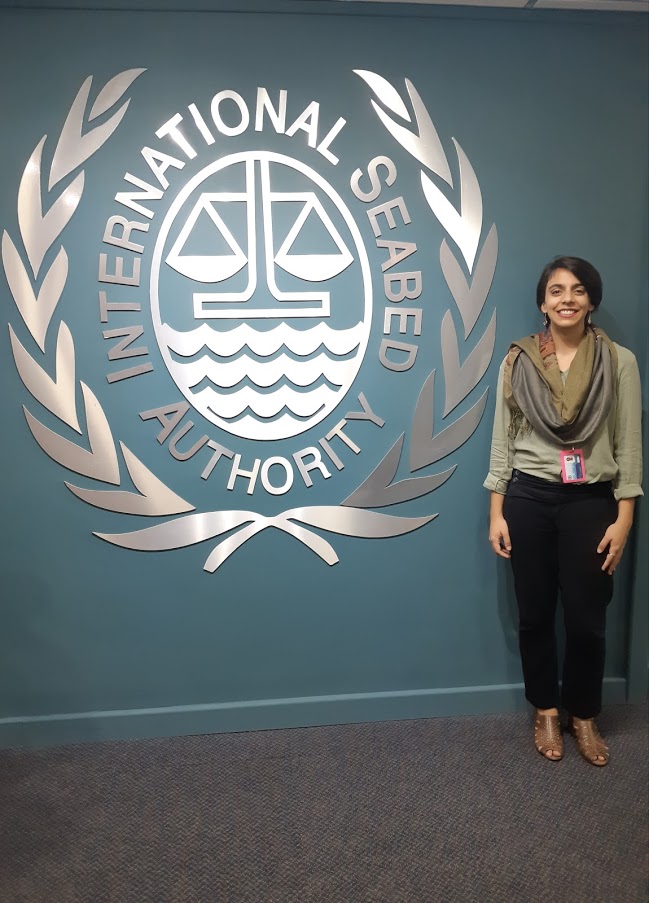 I believe my first engagement with science-to-policy was during my Master’s project, which in general aimed to collect and analyze data to support the creation of a marine protected area in a feeding area for sea turtles in the southwestern coast of Brazil. Now, as a doctoral researcher working with EBM for deep-sea mining, my main challenge is to help translate such a complex concept into what can and should be done in practice. In this aspect, DOSI has provided me with important opportunities to better realize what I can do (and how) to bring the issue to deep-sea mining discussions. In parallel, I’ve been using the knowledge that I’ve gained in the last years to contribute to discussions on the creation of a Law of Sea for Brazil group through the Women’s League for the Ocean.
I believe my first engagement with science-to-policy was during my Master’s project, which in general aimed to collect and analyze data to support the creation of a marine protected area in a feeding area for sea turtles in the southwestern coast of Brazil. Now, as a doctoral researcher working with EBM for deep-sea mining, my main challenge is to help translate such a complex concept into what can and should be done in practice. In this aspect, DOSI has provided me with important opportunities to better realize what I can do (and how) to bring the issue to deep-sea mining discussions. In parallel, I’ve been using the knowledge that I’ve gained in the last years to contribute to discussions on the creation of a Law of Sea for Brazil group through the Women’s League for the Ocean.
What have the main challenges/barriers been and how have you managed them?
I see three critical points as having a major relevance in impacting (whether for good and bad) science-to-policy processes: communication, lack of knowledge and politics. Firstly, responsible and ideal decision-making processes should be primarily driven by the availability of scientific evidence to support such decisions. Scientific knowledge needs to be efficiently translated from a technical language into terms that can be duly understood and interpreted by decision-makers and society. Secondly, there are still too many uncertainties related to deep sea environments, not only to its processes and functioning, but also in terms of acknowledging the effects and extent of adverse consequences arising from human pressures to such environments, such as deep-sea mining. To that list of unknowns, it should be added that the planet, the climate, and consequently, the ocean is changing, and we still don’t know what it is going to result of such mixture of interactions. In that sense, measures towards the adoption of management options should be extra cautious and precautionary.
Finally, the biggest challenge I see to science-to-policy processes is that they are mostly driven by political interests and decisions, which can be very distant to what scientists and most of society would consider acceptable. Changing the status of knowledge is possible, however, it would be much more difficult to change agendas or strategies driven by power dynamics and economic interests. The solution? I really don’t know. But I genuinely believe in the power of voices coming from an informed society; one that is able to ask for more information or explanation before any decisions are taken and aware of the trade-offs that may culminate from such decisions. In this aspect, not only scientists, but journalists and (science) communicators should come together and build bridges with society to inform discussions surrounding the deep sea. The world has shown great concern about environmental disasters such as fires in the Amazon, large oil spills in the ocean or the melting of polar ice caps in the Arctic. We need the same attentive eyes looking to the deep ocean and what is happening there, both in national or international waters.
What different science-to-policy approaches or tools have you been involved in using?
So far I’ve experienced various aspects of bridging science-to-policy. One of them is the development of policy briefs, including two in participation with DOSI colleagues on EBM and deep-sea mining in national waters. As a member of DOSI Minerals WG, I’ve had the opportunity to collaborate in stakeholder consultations promoted by the International Seabed Authority (ISA) and also been part of DOSI delegation in two meetings at the ISA. As part of the DOSI delegation, I experienced the opportunity to help elaborate and deliver science-driven interventions at the ISA (a very exciting experience!). Also as part of DOSI, I have joined colleagues in a meeting with GRULAC (Group of Latin American and Caribbean countries) delegation representatives, where together with another colleague from Costa Rica, we delivered a talk on what we know and don’t know about the deep sea in areas where the ISA has awarded exploration contracts. It was a unique experience to have the chance to exchange ideas with delegation representatives about the importance and characteristics of deep-sea ecosystems and life. This meeting was a game-changer in my perception on the importance of setting a clear and accessible communication forum between scientists and other stakeholders involved in deep-sea mining processes.
Similarly, in national waters, I engaged in delivering a presentation to Brazilian stakeholders and representatives of the Brazilian Congress on the importance of considering future potential human uses in the Blue Amazon, such as deep sea mining, in the current discussions on a “Law of the Sea” for Brazil.
In your opinion, what have been some of the more successful science-to-policy interactions?
I believe that the most successful interactions are those in which all parties have the opportunity to speak, pose questions and be heard. In that sense, I believe that smaller, judgement-free and more welcoming spaces of discussion can facilitate a more candid and effective exchanging of ideas and points of view.
What role does and should science play in ocean governance? Do you feel this is being achieved?
Science plays a pivotal role in ocean governance. Science can greatly contribute to informed decisions, and also allows for flexibility, i.e. the adaptation of measures according to the intrinsic changes in scientific knowledge. Generally speaking, I believe that science is gaining more and more traction in decision-making, including in the aspect of ocean governance. However, I see that there is still a great way to go, not only in terms of strengthening the influence of science in ocean governance, but the realization that science cannot do this alone. For those who work with the ocean, there is a common understanding on the role that the ocean plays in maintaining a healthy planet and ultimately guaranteeing the survival and well-being of human societies. Such viewpoints are now widespread, given that global assessments are making it increasingly clear the pressures and impacts that humans’ activities have in the ocean and how this can impact us back. Ocean challenges are so great that a global movement has been created to contribute to the improvement of the current scenario: The United Nations Decade of Ocean Science for Sustainable Development (The Decade), which aims to achieve a clean, resilient, predictable, safe, sustainable and transparent ocean by 2030. The Decade calls for efforts that are conjoint, transformative and communicative, involving all sectors from society, from the decision-maker to the final users. The Decade is our current window of opportunity to guarantee that science is better integrated into decision-making related to the ocean. Let’s seize it!
What advice would you give to others who wish to engage in advancing science-based policy?
Every so often, we find ourselves immersed in our research, obtaining results, meeting deadlines and preparing publications that we may feel a bit intimidated to get involved in parallel initiatives (which will obviously require us dedicate more time and energy). And yes, efforts to bridge science-to-policy will require your extra time and effort! Hence, I guess the first step is to be sure on why you want to get involved with science-to-policy. Why do you want to engage? What is your motivation? What is your goal? The answers should give you strength to keep you on track and face the challenges to come (including the management of your tasks).
Additionally, be brave! Don’t be afraid of looking for opportunities on how to engage with science-policy. Speak to people you know or have heard of, ask questions, and demonstrate your interest in being involved with such issues. Sooner or later, the opportunity to further engage will arise. Use this thought to foster your courage: how fascinating would it be to see your efforts and hours of work being translated into practice? Working on science is beautiful, but what about seeing it being used in practice? This is what fascinates me the most!
How can science/policy interactions be improved?
I see two main points.
Firstly, we need to better communicate the deep ocean and everything that is happening down there to society at large. Policy-making is a matter of public interest, whether in minor or major scale. People can’t have an informed opinion on what they don’t know. Consequently, I believe that communication relating to the deep ocean should be vastly improved. On the one hand, scientists mostly retain such knowledge in closed laboratory confines, and so it is our role to overcome the barriers of scientific language and communicate to the general public. On the other hand, scientists usually have too much on their plates, so we should think about creating more job opportunities for communications experts who should carry the responsibility of working together with both scientists and decision-makers to guarantee that the message is correctly and efficiently translated between those two groups. This should not, however, be used as an excuse for scientists to keep to their silos of technical language. We need to be able to communicate our science!
Secondly, we should engage more people, especially early-career professionals (ECPs) in discussing what are the opportunities and possibilities for expanding science-to-policy. The world of social-media, mobile apps, and different platforms are constantly improving and changing and I see ECPs as a group that can bring new ideas and refresh the way we see and communicate science, including to decision-makers.

